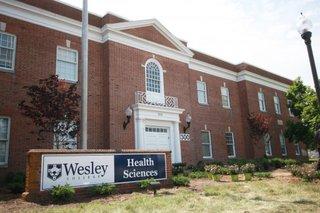By Brittany Wilson (Whetstone Staff Writer)
Wesley College is creating a Master’s program in Occupational Therapy (MOT) to be ready by fall 2016.
The program, which will earn students a degree required to practice as a licensed occupational therapist, has been in the works for nearly two years.
The College’s administration recently received an endorsement for the program from the faculty. Some are still skeptical, but most approved.
“This Master’s is a good fit with our strengths, our mission, and is a demand in the marketplace,†said Dr. Patricia Dwyer, provost and vice president of academic affairs. “The consideration behind any new program is a convergence of these three different benchmarks. For me, this program really stood the test.â€
Some faculty members are more uncertain.
“We have had a lot of budget concerns, so we have to be wise about this—weigh the benefits and the costs,†said Dr. Angela D’Antonio, associate professor and chair of psychology.
The faculty is mostly worried about the program’s expense, she said.
“We can’t just throw a bunch of money at a program proposal and hope it works.â€
D’Antonio said that some faculty members believe energy and resources should be spent bettering existing departments rather than creating a new one. Others believe that, because of the present budget concerns, the timing is wrong, and the college should wait for more financial stability before beginning a new program.
Barbara Abbott, associate professor of kinesiology, favors the program, but said she shares the budget concerns.
“Right now, everybody is going to have his or her own opinions and concerns, and that is their right,†she said. “The financial side of it is definitely a concern that everybody thinks about.â€
Dwyer said start-up costs for a Wesley’s MOT program will be nearly a million dollars.
“There’s some outlay of funds at the beginning, but we’re looking at funding through grants or foundations to help support that,†she said.
A state grant was pledged for the first $250,000, which will pay for the renovations of the unused space in the Health-Science building, where the MOT program will be housed, and a cadaver lab.
Administrators are still researching grants for the remaining $700,000, which will pay for equipment, the two-year program director and field-place coordinator, Dwyer said.
“Once we start to bring students and tuition in, the program will start to fund itself,†she said “The grants are just to get the program up and running until we get to that point.â€
D’Antonio said she is neither for nor against the MOT program, and wants what is best for the college.
“I know there has been a lot of research done to address the viability and sustainability of the program, so that’s good – that’s an important factor,†she said. “If this is something that we can sustain, and we’re not putting money into it at the expense of existing programs, then I am in favor of looking at it more closely.â€
Greg Potts, vice president for enrollment management, said he expects many more applications than acceptances, but there will be room for only 20 first year.
“Our plan is to grow the new OT headcount to 90 by 2021,†he said.
Dr. William Kroen, professor of biology, said there is no way to win or lose unless you play the game.
“The college will be making an investment, up front, on the fact that this is: one, viable; two, going to be accredited; three, going to bring in students; and four, going to eventually pay for itself.â€
That’s a big gamble, he said.
“Do you ever make any money without making a gamble? No.â€
Wesley is now searching for a program director, who will design the program’s curriculum. The individual must be a licensed occupational therapist, qualify for an OT license in Delaware, and have three years of full-time teaching experience. That person will earn $90,000 his or her first year, and $92,000 the second.
Wesley administration intends to select this person by July 1.
A fieldwork coordinator will be hired later to develop the clinical side of the program. This individual will work with the program director to create the curriculum until it is ready for faculty-approval and accreditation. That person will earn $72,000 his or her first year, and $74,000 the second year.
The program will be the first of its kind in Delaware.
“Right now there are no institutions in Delaware that offer OT programs at a master’s level,†Dwyer said. “There are a number of programs in the Philadelphia area, but all of them receive many more applications than they can handle. The other closest one is Towson University in Maryland.â€
Abbott said the MOT program is a great way for Wesley to “step up†in Delaware.
“We’re in its infancy stage, but if done properly and things progress the way we hope they will, I think this will be a boost for Wesley College,†she said. “Times are changing, and things have to change. Wesley has the potential to serve a need in this profession, and serve the students who want to reach that level as well.â€



